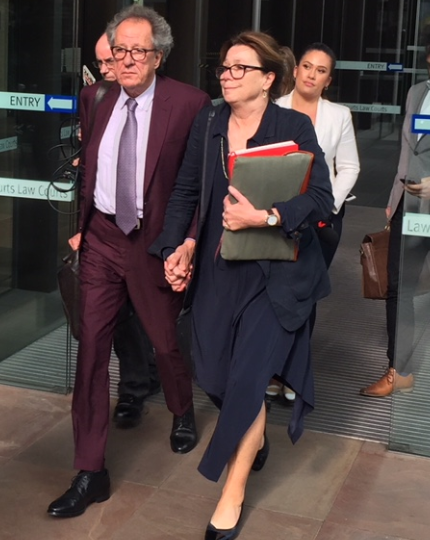‘I have watched him be destroyed’ wife of Geoffrey Rush tells defamation trial
The wife of Geoffrey Rush has told a court how allegations against her husband, and subsequent stories in the Daily Telegraph, have shattered their lives and left him no longer wishing to do the job he loves.

Geoffrey Rush and wife Jane Menelaus leave court at the end of the third day of his defamation action the Daily Telegraph
Jane Menelaus fought back tears as she gave evidence on the third afternoon of Rush’s defamation action against Nationwide News, the publisher of the Telegraph.
She told the court her husband was a changed man since the newspaper carried allegations of “inappropriate behaviour” during Sydney Theatre Company’s production of King Lear in 2015/16.


This is awfull for everyone. Except Murdochs Telegraph who jumped in gleefully to sell newspapers out of it . Parasites
May all the Artists in this world rally against the destructive and temperamental media to save another fellow creative from death by burning.
I think the #MeeToo movement has been an overdue revolution, but we need to be careful not to lynch the innocent. Allowing the press to charge forward with unproven allegations is unacceptable and they must be held accountable.
We don’t know if the allegations are true at this stage and I’m not suggesting they are false because I have no idea, but until Rush is clearly found to be guilty we cannot allow the media to ruin his personal life and career.
If Rush is proven to be guilty then put up the billboards and I’ll stand beneath them and yell out “SCUM” with the rest of you.
I agree with you, but would add to the best of my knowledge there is no legal investigation into Rush’s behaviour. No charges have been laid, and without that process he can’t be found clearly guilty, as you said.
I too support the #MeToo movement, but I think that movement requires legal recourse, not the public shaming of people without due course.
My responses from the first Telegraph report include the questions:
1. Why didn’t the Sydney Theatre Company deal with this initially in house, after which those involved could take it further if they wished.
2. Who leaked to the Telegraph and why?
3. The STC receives tax payer dollars to run the place. What are they bound to do in circumstances like this?
The misunderstanding of this case is worrying. Geoffrey is not on trial. This is a defamation case. Should the Daily Tele have published the story and headline? Was it in the public interest? Whether the claims are true or not is only one part of the case.
I am from outside Australia and don’t kno the first thing about this story and the people involved but what struck me was
1. banter like at any workplace: well, not at mine, I wouldn’t dream to act anything like that guy towards my female co-workers
2. he says he doesn’t remember a lot.